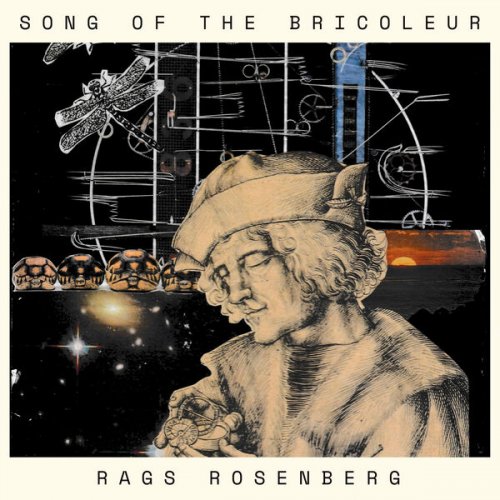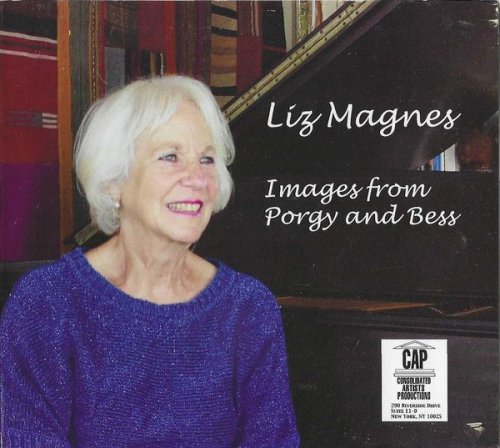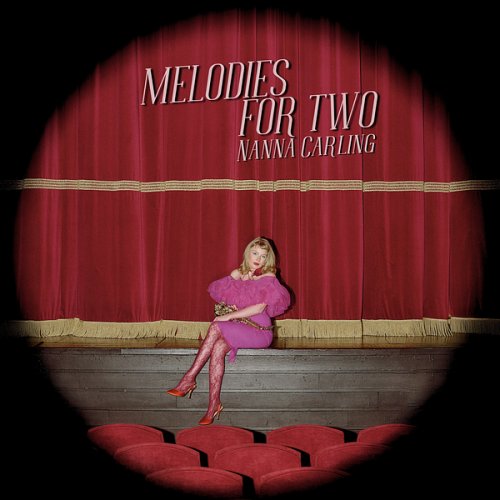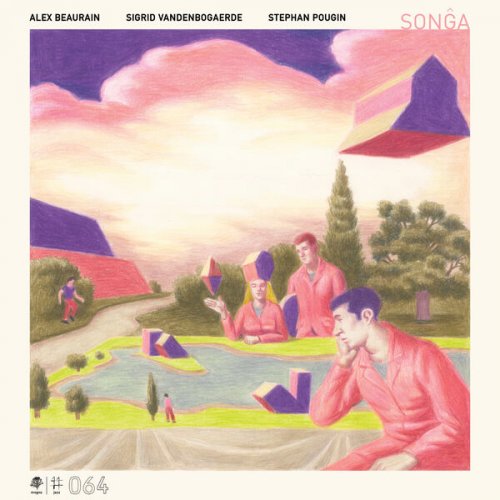Rags Rosenberg - Song of the Bricoleur (2025) [Hi-Res]

Artist: Rags Rosenberg
Title: Song of the Bricoleur
Year Of Release: 2025
Label: Coyote Gulch Records
Genre: Folk, Singer-Songwriter
Quality: mp3 320 kbps / flac lossless (tracks) / flac 24bits - 48.0kHz
Total Time: 00:55:25
Total Size: 129 / 340 / 650 mb
WebSite: Album Preview
TracklistTitle: Song of the Bricoleur
Year Of Release: 2025
Label: Coyote Gulch Records
Genre: Folk, Singer-Songwriter
Quality: mp3 320 kbps / flac lossless (tracks) / flac 24bits - 48.0kHz
Total Time: 00:55:25
Total Size: 129 / 340 / 650 mb
WebSite: Album Preview
01. Bullfrogs
02. California Bound
03. Catherine's Song
04. Eye On You
05. Flower Time
06. John Doe
07. Smokey Joe's (Radio Edit)
08. Song of the Bricoleur
09. These Bones
10. Ticket To The Game
11. True Believer
12. The Code
Based in California, the weathered, husky-voiced 78-year-old Rosenberg (named Phillip, his musical soubriquet comes from WB Yeats’ “foul rag and bone shop of the heart”) is a poet/songwriter-storyteller in the Cohen tradition, weaving compelling narratives, magnetic melodies and articulate lyrics into songs that, coloured with pedal steel, brass, violin, piano, dobro, accordion and upright bass, draw you in and then linger in the mind.
Working on a get the most downbeat out of the way first principle, it opens on the circular strummed climate change blindness-themed ‘Bullfrogs’ (“I knew the flood was comin’ what was I s’posed to do?/One body cannot stop the wave…There’ll be time and time again we all thought…We scraped the earth for fortune, we scraped the sky for fame…The signs we just ignored ‘em while it all went up in flames/Who knew we had so much to lose”). It ends, pessimistically, with “they say God has a plan/But that’s exactly what worries me/You see, I’ve read his book, he saves a chosen few and/The rest drown in the rising sea”.
Not that things are exactly much brighter on the following ‘John Doe’, a resonator guitar driven throatily sung country number sung in the voice of a dead anonymous homeless man (“they call me John Doe/It’s written on this tag tied to my toe/They found me ‘neath a bridge under a blanket of snow”) as, a veteran with PTSD, he recounts what led him to his plight (“Back from the war, my head wasn’t right/Took little white pills to make it through the night/First went the car, then the house and the wife/A tent on the street, the shopping cart life/Somebody tell me how your story lives on/When your name don’t live on anyone’s tongue”). File it next to ‘The Ballad Of Ira Hayes’.
The mood picks up lyrically and musically for the drawlingly spoken ‘Smokey Joe’s’ (reworked, as are three others, from his 2019 debut Flower Time) which, namechecking Prine, Clark, Dylan, Cohen, Waits and Joni, and referencing ‘Illegal Smile’, ‘Homegrown Tomatoes’, ‘Visions Of Johanna’, ‘Hallelujah’, ‘Ol 55’ and ‘Both Sides Now’, celebrates a welcoming dive bar that sells a single malt you can’t get anywhere else, but is really a homage to the music greats, carrying the message “So all you young songwriters streaming into town/Seeking fame and fortune, playing all the rounds/I hope you crack the code and the charts are kind to you/And you get let down easy when the new kids all come through/But if you’re huntin’ bigger game, if you after real gold/I pray someday you make your way down to Smokey Joe’s”.
It’s back to a first person narrative with the fingerpicked, steel-coloured ‘True Believer’, a potent commentary on the toxic relationship between religion and war (“I rode with the Young Crusaders Oh, I had so much to learn/We crushed that godless resistance Everywhere our flag unfurled… I was dying to die for the cause…I swear I wasn’t in it for the glory, I swear a higher purpose called to me/The truth of my merciless master was the only truth I could see”) and all those true believers killing for different gods, “Preaching our brand of the gospel/Never counting the cost”.
Haunted by a ghostly desert howl, ‘Eye On You’ feeds on the anxiety and paranoia born of a surveillance prevalent 1984-style society (“I’ve been watching you a while/I know your habits/I know your style…the news you watch and the books you read…I sit in darkness/I watch the screen/You can’t see me laugh/You can’t hear me scream/But I hear you whisper/Every hello and goodbye/Your whole life parades before my eye/And when my shift is over I go home and cook my soup/And as I sit and sip I know they’re watchin’ me too”). A world where “signs of resistance” are “met with the fist” and a list that “keeps us safe and sound/From the malcontents who’d bring or system down”. It reads like a MAGA policy statement.
Gummily sung, one of four pushing past five minutes, the vocally and effects-treated, violin-shaded, muted drums ‘These Bones’ with its sombre Native American chant musical flavours is fed by thoughts of failure (“the young man charts a course for the islands/The old man wonders where it all went wrong”) and mortality (“They say we come in trailing clouds of glory/When we go out we’re glory bound/I never could believe that story…if disbelief condemns me to damnation/Send me where you will…these bones have always known their destination/Six by three, ponderosa pine”). Longer still at over six, with a late night bass, sax and rumbling drums jazzy vibe and Waitsian tones, ‘Ticket To The Game’ has a former preacher bemoaning how he sold out faith for fortune (“I studied for the priesthood/But I was good at sales…I had a taste for finer things, things with expensive names/I traded in those vows for a ticket to the game/I bought into the market, watched how the big boys play/Learned how to cook the books, how to look the other way/Robbed Peter to pay Paul and the cash kept rolling in”), and enough rope to tie his own noose (“Turns out the gods I prayed to rewards you for your sins/I always thought I’d go legit, soon came to realize/The ticket that I purchased was a one way ride/Once you’re in, you’re in for keeps, ain’t no turning round ‘till your house of cards tumbles to the ground”) as he prepares to commit suicide (“The Feds are banging on the door, the chair begins to shake/I left this note for you my friend, you who love champagne/I hope the Cartier’s worth the price you’ll pay for your ticket to the game”).
The fingerpicked, shaker-shimmered, accordion-aided slow swaying Cohenesque title track takes its cue from the French term for someone who improvises using available materials and ideas, an ideas pertinent to musicians, here a band that symbolically includes Picasso and Robespierre, the lyrics going on to speak of crisis of faith (“Father Ryan complains to his therapist… ever since Fred pronounced God dead, well it’s been kinda shaky ‘round here”) and Columbus’s compass spinning wildly, wittily ending with “Me, I’m under the table feeding my appetites/Making my way thru the buffet, never satisfied/The chef appears in the doorway, everyone turns to the sound/We’re all out of meat and potatoes, folks/But it’s Crème Brule all around”.
Another storysong, an American Dream mournful lament, ‘California Bound’ with its symbolic meaning is set in 1938 as, faced with the Depression, two brothers set out from Detroit on Christmas Eve to try and find work in Los Angeles but “We got as far as Santa Fe/Christmas ‘39/Beggin’ for a dime/Pneumonia took dear brother Nate/that was all she wrote/Never saw the coast/Now I’m stuck here in Vegas livin’ on the street”.
Arranged for piano with a hint of Randy Newman and a choral setting, ‘Flower Time’ is a terrific ballad that initially seems to be headed into despair (“Today I went out walking down my garden path/the lilacs and the lilies had all gone to seed”) but quickly gathers into images of recovery and hope (“Precious dreams plowed under, seems they’re coming up again/And don’t they all look different in this late September sun?/Flower time is over boys, The ripening has begun”), the metaphor couched in a now older musician rediscovering his calling (“I traded in these six strings for a 9-5/Rent to pay and little mouths to feed/But I couldn’t hear the music in that simple daily grind…Now the garden hums a tune it was singing all along/Now it strikes a deeper chord, now I’m singing a different song”).
The penultimate, tinkling piano-backed ‘Catherine’s Song’ is a simple love letter thank you for emotional rescue (“When my life lost its shine/She reached down beneath my mind/I saw the world for the very first time again/She’s a dream propeller, she’s interstellar/She rides a shooting star/Don’t try to fight her, just hold on tighter”), though closer examination suggests it’s addressed to the power of music and its inspiration (“the siren song I long to hear”) not a woman.
It ends with one last social commentary, or rather poem, upright bass backing the spoken word ‘The Code’ about how we (“baby boomers, mother earthers. generations x and y, millennials , perennials”) become part of the consumerist pattern with “Every generation a new iteration/Urges cleverly instilled then distilled from each decade’s cultural inheritance and sold back to us as The New Black”) and how we’re all part of a code “that describes each of our labels and contains the root instruction: “There is nothing that cannot be commodified/Simulacrified, ad infinitum”…that my friends is what it means to speak the lingua franca of the New Metropolis”.
With echoes of Marshall McLuhan, Rosenberg notes how “our language morphs as the new reality steps forth, rises to the surface and reveals itself to us…your identity is erased and in its place comes now your own personal brand, the brand you design from one of the many interesting templates provided/You will be held accountable, accounting being the daily ritual practiced by the faithful” with “Accountants, the new priests who watch for the signs, predict the future, consecrate the holy spreadsheets and mediate salvation with the all powerful yet petulant gods of the economy”.
It’s a social media age where “Friendship, once a carefully cultivated garden of delightscan now be accomplished with a quick click/You can like and be liked so painlessly you find you have 753 “friends” you’ve never met” as “the new reality steps forth,rises to the surface and reveals itself to us”. A techno reality where surveillance is constant and “my face can be digitized, recognized, my fingers printed and my social security number stolen/And all the while, high in their steel and glass temples, the well-suited CEOs keep their eyes on the cash flow, bow to the Dow, pray to our lady of consumption”. But despair is tempered because “in the distances there are resistances…a few who refuse to be metropolitanized, post modernized, off the gridders, intentional livers/And their refusal to participate in the new market-speak is a leak in the integrity of the code”. Basically, it’s his answer to Gil Scott Heron’s ‘The Revolution Will Not Be Televised’.
With this album Rosenberg proves he’s not just another bricoleur in the wall, he’s one of the very building blocks.

![Sam Dillon, Andrew Gould - Trade Off (2025) [Hi-Res] Sam Dillon, Andrew Gould - Trade Off (2025) [Hi-Res]](https://www.dibpic.com/uploads/posts/2025-12/1765497612_e7q3c9soiingb_600.jpg)
![Nābu Pēra - Soundscapes of Nicosia (2025) [Hi-Res] Nābu Pēra - Soundscapes of Nicosia (2025) [Hi-Res]](https://img.israbox.com/img/2025-12/14/lhs20jten1ip5ht0uibyjocfe.jpg)

![Chewing, Dave Harrington, Ryan Hahn, Spencer Zahn - Quintet (Live in Los Angeles) (2025) [Hi-Res] Chewing, Dave Harrington, Ryan Hahn, Spencer Zahn - Quintet (Live in Los Angeles) (2025) [Hi-Res]](https://img.israbox.com/img/2025-12/12/owakjkfg0whflv2rzyocno89p.jpg)


![Machito and His Orchestra - Irving Berlin in Latin America (Remastered Edition 2025) [Hi-Res] Machito and His Orchestra - Irving Berlin in Latin America (Remastered Edition 2025) [Hi-Res]](https://www.dibpic.com/uploads/posts/2025-12/1765784965_moib.jpg)
